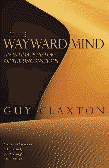The Wayward Mind - An Intimate Happiness of the Unconscious
 |
Author: Guy Claxton |
Nowadays everybody is an amateur psychologist. We all have theories as to why friends and family behave as they do and we seek to explain everything psychologically. But it wasn’t always so.
Guy Claxton explores the history of the unconscious, as well as up to the minute science relating to how your brain produces unexpected associations, sensations and thoughts and intuitions.
In days of old, human creativity, love, inspiration and negative emotions such as fear and hate were seen as coming from the ‘outside’ rather than processes originating in the brain. So the ancient Greeks thought that the goddess Aphrodite made you fall in love by whispering in your ear, perhaps when you were asleep, and that it was the gift of a ‘muse’ which made you creative. In medieval times human psychological experience was externalised as the work of ‘demons’ or ‘angels’. Today, someone who externalised their cognitive experience to this extent would be said to be ‘mad’, because the current rationale for personal experience of the world (at least in the western world) is psychological. These experiences are now described in terms of brain circuitry.
As always, Claxton’s work is wonderfully easy to read and very entertaining. He shows how descriptions of Hades and the underworld in mythology can be linked to modern ideas of the unconscious mind. He gives a history of the development of the many different theories as to what the unconscious mind is actually for. He discusses how metaphor interacts with consciousness and why all the great teachers from Jesus to Mohammed communicated in parables.
It all makes for a fascinating read, but perhaps lacks the conceptual clarity on the same topic found in the final chapter (‘Consciousness more or less’) of Human Givens: A New approach to emotional health and clear thinking by Joe Griffin and Ivan Tyrrell.
That quibble aside, Guy Claxton is a great writer and an innovative thinker. Reading this book is a great guide to the history of ideas of the mind and to how our views on ‘humanity’ are inescapably moulded by the prevailing mythology (whether devils and angels or brain circuitry) of the time.
I recommend this book wholeheartedly.
Review by Mark Tyrrell
Also by Guy Claxton: Hare Brain, Tortoise Mind, Wise Up








